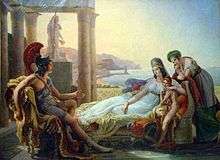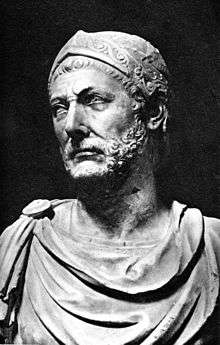Hasdrubal Barca
| Hasdrubal, son of Hamilcar Barca | |
|---|---|
 | |
| Born |
245 BC Carthage, Tunisia |
| Died |
207 BC Metauro River, Italy |
| Allegiance | Carthaginian Republic |
| Rank | General |
| Battles/wars | |
Hasdrubal Barca (245–207 BC) was Hamilcar Barca's second son and a Carthaginian general in the Second Punic War. He was the brother of the famous Hannibal.
Youth and Iberian leadership

Little is known of Hasdrubal's early life. He was present, along with his brother Hannibal, when his father, Hamilcar, besieged the city of Helice. Hamilcar was forced to flee and died drowning in the Jucar River.[1] Little is known about his activities during the time Hasdrubal the Fair led the Punic forces in Spain, or during the campaigns of Hannibal Barca in Spain and his Siege of Saguntum.
Hannibal, when he set out for Italy in 218 BC, left a force of 13,000 infantry, 2,550 cavalry and 21 war elephants in Iberia. The Punic navy had a fleet of 50 Quinqueremes and 5 Triremes stationed there. However, only 32 Quinqueremes were manned at the start of the Second Punic War. Hasdrubal commanded this force and was to set out for Italy in 217 BC to reinforce Hannibal. Hannibal left another army under Hanno in Catalonia, consisting of 10,000 foot and 1,000 horse on his way to Italy in 218 BC.
Left in command of Hispania when Hannibal departed to Italy in 218 BC, Hasdrubal was destined to fight for six years against the brothers Gnaeus and Publius Cornelius Scipio. The expedition led by Gnaeus Scipio in 218 BC had caught the Carthaginians by surprise, and before Hasdrubal could join Hanno, the Carthaginian commander on the North of Ebro River, the Romans had fought and won the Battle of Cissa and established their army at Tarraco and their fleet at Emporiae. Hasdrubal, commanding only 8,000 troops and outnumbered by the Romans, raided the Romans with a flying column of light infantry and cavalry, which inflicted severe losses on their naval crews and reduced the fighting strength to 35 ships. This loss was offset by the arrival of an allied Greek contingent from the city of Massilia.
In the spring of 217 BC, Hasdrubal led a joint expedition north to fight the Romans. He commanded the army, while his deputy commanded the fleet. The Punic Army and the fleet moved north side by side and encamped on the mouth of the Ebro River. Carelessness of the Carthaginian fleet enabled Gnaeus Scipio to surprise the Carthaginians and crush their naval contingent at the Battle of Ebro River. Hasdrubal retreated without fighting the Roman army. The year 216 was spent quelling an uprising of Iberian tribes, possibly the Turdetanii around the area near Gades.
Hasdrubal was reinforced by 4,000 infantry and 500 cavalry and was ordered by the Carthaginian senate to march to Italy in the same year. He left Himilco the Navigator in charge at Cartagena and marched for the Ebro river, but was heavily defeated in the Battle of Dertosa in the spring of 215 BC. This defeat prevented reinforcements reaching Hannibal from both Iberia and Africa at a critical moment of the War, when the Carthaginians held the upper hand in Italy. The Carthaginians from then on were forced to contest the Romans in the area between the Ebro and Jucor rivers.
Joint command
This defeat also led to Mago and Hasdrubal Gisco arriving in Iberia with two armies and ending the undisputed command of the Barcid family in Iberia. The Carthaginains fought the Scipio brothers and had on the whole the worst of the conflict between 215 and 212 BC, but managed to prevent the loss of any territory. At the instigation of the Romans, Syphax, one of the kings of the Numidian tribes, attacked Carthaginian territories in Africa in 213/212 BC. The situation in Iberia was sufficiently under control, because Hasdrubal and his Iberian army crossed over to Africa and crushed the threat of Syphax in a battle where 30,000 Numidians were killed. With his Roman- trained army shattered, Syphax fled to Mauritania. The aid of Masinissa, a Numidian prince, was invaluable during this episode, and he crossed over to Iberia with Hasdrubal after the African expedition ended with 3,000 Numidian cavalry.
In late 212 BC, Hasdrubal, with timely cooperation from Mago Barca and Hasdrubal Gisco, completely routed his opponents at the Battle of the Upper Baetis, destroying the majority of the Roman army in Iberia and killing both the Scipios. Carthaginians gained control of Iberia up to the Ebro as a result of this victory. However, the lack of cooperation between the Carthginian generals after the battle led to the surviving Roman force of 8,000 retiring north of the Ebro River safely. These troops somehow managed to keep the Carthaginian armies from gaining a foothold north of the Ebro. The Romans reinforced this detachment with 10,000 troops under Claudius Nero in 211 BC and with another 10,000 soldiers under Scipio Africanus Major in 210 BC, who spent the year training his army and improving his diplomatic contacts.
The Carthaginian armies had dispersed in the interior of Iberia in 209 BC, possibly to maintain control over the Iberian tribes, which they were dependent on for soldiers and provisions. The Carthaginian armies were subsequently outgeneralled by Scipio Africanus Major, who, taking advantage of the absence of the three Carthaginian armies in 209 BC, captured Carthago Nova and gained other advantages. Hasdrubal was defeated by Scipio at the Battle of Baecula but managed to retreat with two-thirds of his army intact.
Second Carthaginian expedition to Italy
Later in 209 BC, Hasdrubal was summoned to join his brother in Italy. He eluded Scipio by crossing the Pyrenees at their western extremity and safely made his way into Gaul in the winter of 208. Hasdrubal had waited until the spring of 207 to make his way through the Alps and into Northern Italy. Hasdrubal made much faster progress than his brother had, partly due to the construction left behind by Hannibal's army when he had passed via the same route a decade earlier, but also due to the removal of the Gallic threat that had plagued Hannibal early on. The Gauls now feared and respected the Carthaginians, and not only was Hasdrubal allowed to pass through the Alps unmolested, his ranks were bolstered by many enthusiastic Gauls. Hasdrubal, in the same fashion as his brother, succeeded in bringing his war elephants, raised and trained in Hispania. It was not until Hasdrubal sent messengers to Hannibal that decisive measures were taken. Hasdrubal wished to meet with his brother in South Umbria. However, this was not to be. Hasdrubal's messengers were captured, and he was ultimately checked by two Roman armies. Being forced to give battle, he was decisively defeated at the Battle of the Metaurus. Hasdrubal himself died bravely in the fight. Afterwards, he was beheaded and his head packed in a sack and thrown into his brother Hannibal's camp as a sign of his utter defeat. This action was in stark contrast to Hannibal's treatment of the bodies of fallen Roman Consuls.
Hasdrubal in literature
- Pride of Carthage, by David Anthony Durham
- "The Histories," by Polybius
- "The Fortune of Carthage" by William Kelso published 2012. Covers Hasdrubal's 207 BC Metaurus campaign.

